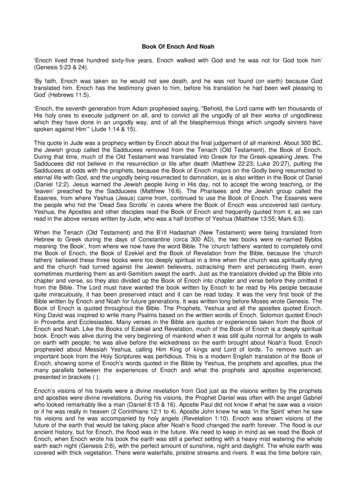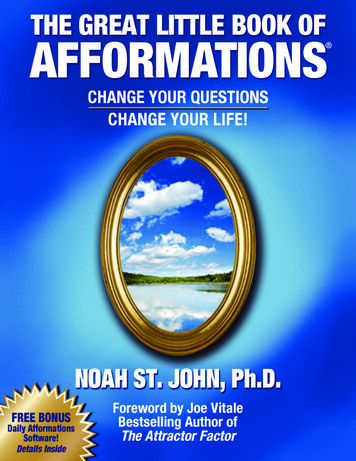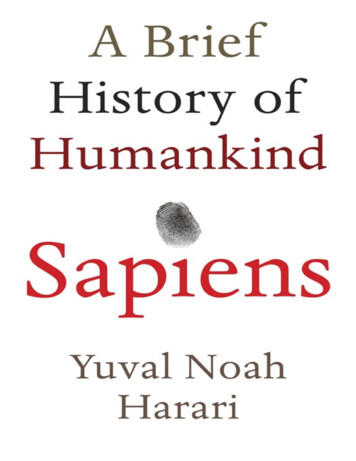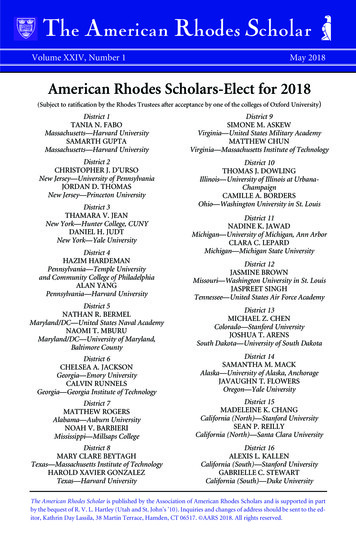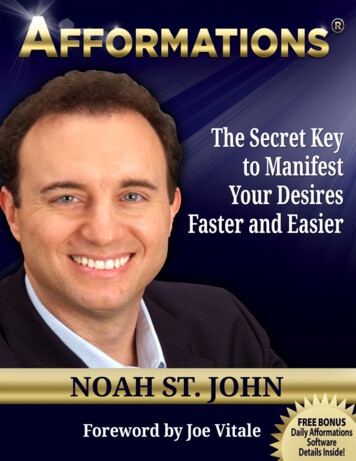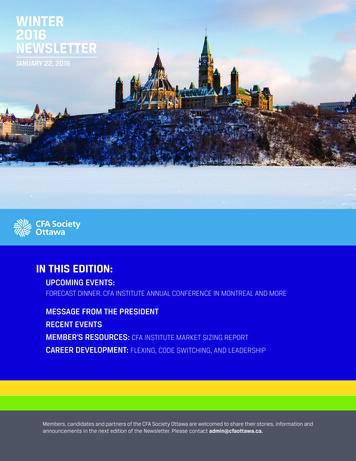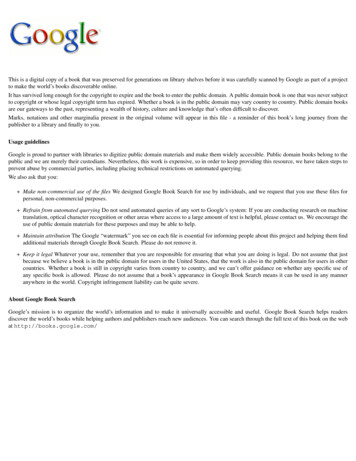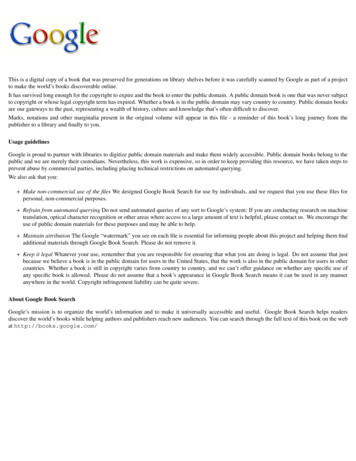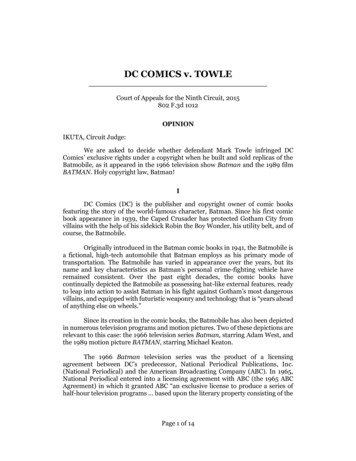
Transcription
Copyright 2016 by Trevor NoahAll rights reserved.Published in the United States by Spiegel& Grau, an imprint of Random House, adivision of Penguin Random House LLC,New York.SPIEGEL & GRAU and Design is aregistered trademark of Penguin RandomHouse LLC.Library of Congress Cataloging-inPublication DataNames: Noah, Trevor, author.Title: Born a crime: stories from a SouthAfrican childhood / by Trevor Noah.Description: First edition. New York :Spiegel & Grau, 2016.Identifiers: LCCN 2016031399 ISBN
9780399588174 ISBN 9780399590443(international) ISBN 9780399588181(ebook)Subjects: LCSH: Noah, Trevor Comedians—United States—Biography. Comedians—South Africa—Biography. Television personalities—United States—Biography.Classification: LCC PN2287.N557 A3 2016 DDC 791.4502/8092 [B]—dc23 LCrecord available at https://lccn.loc.gov/ 2016031399Ebook ISBN 9780399588181spiegelandgrau.comBook design by Susan Turner, adaptedfor ebookCover design: Greg MollicaCover image: Mark Stutzman, based on aphotograph by Kwaku Alston (Trevor
Noah); Getty Images (background)v4.1ep
ContentsCoverTitle PageCopyrightImmorality Act, 1927Part IChapter 1: RunChapter 2: Born a CrimeChapter 3: Trevor, PrayChapter 4: ChameleonChapter 5: The Second Girl
Chapter 6: LoopholesChapter 7: FufiChapter 8: RobertPart IIChapter 9: The Mulberry TreeChapter 10: A Young Man’s Long,Awkward, Occasionally Tragic,and Frequently HumiliatingEducation in Affairs of theHeart, Part I: Valentine’s DayChapter 11: OutsiderChapter 12: A Young Man’s Long,Awkward, Occasionally Tragic,and Frequently HumiliatingEducation in Affairs of the
Heart, Part II: The CrushChapter 13: ColorblindChapter 14: A Young Man’s Long,Awkward, Occasionally Tragic,and Frequently HumiliatingEducation in Affairs of theHeart, Part III: The DancePart IIIChapter 15: Go Hitler!Chapter 16: The Cheese BoysChapter 17: The World Doesn’tLove YouChapter 18: My Mother’s LifeDedication
AcknowledgmentsAbout the Author
IMMORALITYACT, 1927To prohibit illicit carnalintercourse betweenEuropeans and nativesand other acts in relationthereto.B E IT ENACTED by the King’sMost Excellent Majesty, the Senate
and the House of Assembly of theUnion of South Africa, as follows:—1. Any European male who hasillicit carnal intercourse with anative female, and any native malewho has illicit carnal intercoursewith a European female shall beguilty of an offence and liable onconviction to imprisonment for aperiod not exceeding five years.2. Any native female whopermits any European male to haveillicit carnal intercourse with herand any European female whopermits any native male to haveillicit carnal intercourse with hershall be guilty of an offence andliableonconvictiontoimprisonment for a period notexceeding four years .
T hegenius of apartheid wasconvincing people who were theoverwhelming majority to turn oneach other. Apart hate, is what itwas. You separate people intogroups and make them hate oneanother so you can run them all.At the time, black SouthAfricans outnumbered white SouthAfricans nearly five to one, yet wewere divided into different tribeswith different languages: Zulu,Xhosa, Tswana, Sotho, Venda,Ndebele, Tsonga, Pedi, and more.Long before apartheid existedthese tribal factions clashed and
warred with one another. Thenwhite rule used that animosity todivide and conquer. All nonwhiteswere systematically classified intovarious groups and subgroups.Then these groups were givendiffering levels of rights andprivileges in order to keep them atodds.Perhaps the starkest of thesedivisions was betweenSouthAfrica’s two dominant groups, theZulu and the Xhosa. The Zulu manis known as the warrior. He isproud. He puts his head down andfights. When the colonial armiesinvaded, the Zulu charged intobattle with nothing but spears andshields against men with guns. TheZulu were slaughtered by thethousands, but they never stopped
fighting. The Xhosa, on the otherhand, pride themselves on beingthe thinkers. My mother is Xhosa.Nelson Mandela was Xhosa. TheXhosa waged a long war against thewhite man as well, but afterexperiencing the futility of battleagainst a better-armed foe, manyXhosa chiefs took a more nimbleapproach. “These white people arehere whether we like it or not,”they said. “Let’s see what tools theypossess that can be useful to us.Instead of being resistant toEnglish, let’s learn English. We’llunderstand what the white man issaying, and we can force him tonegotiate with us.”The Zulu went to war with thewhite man. The Xhosa played chesswith the white man. For a long time
neitherwasparticularlysuccessful, and each blamed theother for a problem neither hadcreated. Bitterness festered. Fordecades those feelings were held incheck by a common enemy. Thenapartheid fell, Mandela walkedfree, and black South Africa wentto war with itself.
RUNSometimes in big Hollywoodmovies they’ll have these crazychase scenes where somebodyjumps or gets thrown from amoving car. The person hits theground and rolls for a bit. Then theycome to a stop and pop up and dustthemselves off, like it was no big
deal. Whenever I see that I think,That’s rubbish. Getting thrown outof a moving car hurts way worsethan that.I was nine years old when mymother threw me out of a movingcar. It happened on a Sunday. Iknow it was on a Sunday becausewe were coming home from church,and every Sunday in my childhoodmeant church. We never missedchurch. My mother was—and still is—a deeply religious woman. VeryChristian. Like indigenous peoplesaround the world, black SouthAfricans adopted the religion of ourcolonizers. By “adopt” I mean it was
forced on us. The white man wasquite stern with the native. “Youneed to pray to Jesus,” he said.“Jesus will save you.” To which thenative replied, “Well, we do need tobe saved—saved from you, butthat’s beside the point. So let’s givethis Jesus thing a shot.”My whole family is religious,but where my mother was TeamJesus all the way, my grandmotherbalanced her Christian faith withthe traditional Xhosa beliefs she’dgrown up with, communicatingwith the spirits of our ancestors.For a long time I didn’t understandwhy so many black people had
abandoned their indigenous faithfor Christianity. But the more wewent to church and the longer I satin those pews the more I learnedabout how Christianity works: Ifyou’re Native American and youpray to the wolves, you’re a savage.If you’re African and you pray toyour ancestors, you’re a primitive.But when white people pray to aguy who turns water into wine,well, that’s just common sense.My childhood involved church,or some form of church, at leastfour nights a week. Tuesday nightwas the prayer meeting. Wednesdaynight was Bible study. Thursday
night was Youth church. Friday andSaturday we had off. (Time to sin!)Then on Sunday we went to church.Three churches, to be precise. Thereason we went to three churcheswas because my mom said eachchurchgavehersomethingdifferent. The first church offeredjubilant praise of the Lord. Thesecond church offered deep analysisof the scripture, which my momloved. The third church offeredpassion and catharsis; it was a placewhere you truly felt the presence ofthe Holy Spirit inside you.Completely by coincidence, as wemoved back and forth between
these churches, I noticed that eachone had its own distinct racialmakeup: Jubilant church was mixedchurch. Analytical church was whitechurch. And passionate, catharticchurch, that was black church.Mixed church was Rhema BibleChurch. Rhema was one of thosehuge,supermodern,suburbanmegachurches. The pastor, RayMcCauley, was an ex-bodybuilderwith a big smile and the personalityof a cheerleader. Pastor Ray hadcompeted in the 1974 Mr. Universecompetition. He placed third. Thewinner that year was ArnoldSchwarzenegger. Every week, Ray
would be up onstage working reallyhard to make Jesus cool. There wasarena-style seating and a rock bandjamming out with the latestChristiancontemporarypop.Everyone sang along, and if youdidn’t know the words that wasokay because they were all right upthere on the Jumbotron for you. Itwas Christian karaoke, basically. Ialways had a blast at mixed church.White church was RosebankUnion in Sandton, a very white andwealthy part of Johannesburg. Iloved white church because I didn’tactually have to go to the mainservice. My mom would go to that,
and I would go to the youth side, toSunday school. In Sunday school wegot to read cool stories. Noah andthe flood was obviously a favorite; Ihad a personal stake there. But Ialso loved the stories about Mosesparting the Red Sea, David slayingGoliath, Jesus whipping the moneychangers in the temple.I grew up in a home with verylittle exposure to popular culture.Boyz II Men were not allowed in mymother’s house. Songs about someguy grinding on a girl all night long?No, no, no. That was forbidden. I’dhear the other kids at schoolsinging “End of the Road,” and I’d
have no clue what was going on. Iknew of these Boyz II Men, but Ididn’t really know who they were.The only music I knew was fromchurch: soaring, uplifting songspraising Jesus. It was the same withmovies. My mom didn’t want mymind polluted by movies with sexand violence. So the Bible was myaction movie. Samson was mysuperhero. He was my He-Man. Aguy beating a thousand people todeath with the jawbone of adonkey? That’s pretty badass.Eventually you get to Paul writingletters to the Ephesians and it losesthe plot, but the Old Testament and
the Gospels? I could quote youanything from those pages, chapterand verse. There were Bible gamesand quizzes every week at whitechurch, and I kicked everyone’s ass.Then there was black church.There was always some kind ofblack church service going onsomewhere, and we tried them all.In the township, that typicallymeant an outdoor, tent-revival-stylechurch. We usually went to mygrandmother’s church, an oldschool Methodist congregation, fivehundred African grannies in blueand-white blouses, clutching theirBibles and patiently burning in the
hot African sun. Black church wasrough, I won’t lie. No airconditioning. No lyrics up onJumbotrons. And it lasted forever,three or four hours at least, whichconfused me because white churchwas only like an hour—in and out,thanks for coming. But at blackchurch I would sit there for whatfelt like an eternity, trying to figureout why time moved so slowly. Is itpossible for time to actually stop? Ifso, why does it stop at black churchand not at white church? Ieventually decided black peopleneeded more time with Jesusbecause we suffered more. “I’m
here to fill up on my blessings forthe week,” my mother used to say.The more time we spent at church,she reckoned, the more blessingswe accrued, like a StarbucksRewards Card.Black church had one savinggrace. If I could make it to the thirdor fourth hour I’d get to watch thepastor cast demons out of people.People possessed by demons wouldstart running up and down theaisles like madmen, screaming intongues. The ushers would tacklethem, like bouncers at a club, andhold them down for the pastor. Thepastor would grab their heads and
violently shake them back andforth, shouting, “I cast out thisspirit in the name of Jesus!” Somepastors were more violent thanothers, but what they all had incommon was that they wouldn’tstop until the demon was gone andthe congregant had gone limp andcollapsed on the stage. The personhad to fall. Because if he didn’t fallthat meant the demon was powerfuland the pastor needed to come athim even harder. You could be alinebacker in the NFL. Didn’tmatter. That pastor was taking youdown. Good Lord, that was fun.Christiankaraoke,badass
action stories, and violent faithhealers—man, I loved church. Thething I didn’t love was the lengthswe had to go to in order to get tochurch. It was an epic slog. We livedin Eden Park, a tiny suburb wayoutside Johannesburg. It took us anhour to get to white church, anotherforty-five minutes to get to mixedchurch, and another forty-fiveminutes to drive out to Soweto forblack church. Then, if that wasn’tbad enough, some Sundays we’ddouble back to white church for aspecial evening service. By the timewe finally got home at night, I’dcollapse into bed.
This particular Sunday, theSunday I was hurled from a movingcar, started out like any otherSunday. My mother woke me up,made me porridge for breakfast. Itook my bath while she dressed mybaby brother Andrew, who was ninemonths old. Then we went out tothe driveway, but once we werefinally all strapped in and ready togo, the car wouldn’t start. My momhad this ancient, broken-down,bright-tangerine Volkswagen Beetlethat she picked up for next tonothing. The reason she got it fornext to nothing was because it wasalways breaking down. To this day I
hate secondhand cars. Almosteverything that’s ever gone wrongin my life I can trace back to asecondhand car. Secondhand carsmade me get detention for beinglate for school. Secondhand cars leftus hitchhiking on the side of thefreeway. A secondhand car was alsothe reason my mom got married. Ifit hadn’t been for the Volkswagenthat didn’t work, we never wouldhave looked for the mechanic whobecame the husband who becamethe stepfather who became the manwho tortured us for years and put abullet in the back of my mother’shead—I’ll take the new car with the
warranty every time.As much as I loved church, theidea of a nine-hour slog, frommixed church to white church toblack church then doubling back towhite church again, was just toomuch to contemplate. It was badenough in a car, but taking publictransport would be twice as longand twice as hard. When theVolkswagen refused to start, insidemy head I was praying, Please saywe’ll just stay home. Please saywe’ll just stay home. Then I glancedover to see the determined look onmy mother’s face, her jaw set, and Iknew I had a long day ahead of me.
“Come,” she said. “We’re goingto catch minibuses.”—My mother is as stubborn as she isreligious. Once her mind’s made up,that’s it. Indeed, obstacles thatwould normally lead a person tochange their plans, like a carbreaking down, only made her moredetermined to forge ahead.“It’s the Devil,” she said aboutthe stalled car. “The Devil doesn’twant us to go to church. That’s whywe’ve got to catch minibuses.”Whenever I found myself up
against my mother’s faith-basedobstinacy, Iwould try, asrespectfully as possible, to counterwith an opposing point of view.“Or,” I said, “the Lord knowsthat today we shouldn’t go tochurch, which is why he made surethe car wouldn’t start, so that westay at home as a family and take aday of rest, because even the Lordrested.”“Ah, that’s the Devil talking,Trevor.”“No, because Jesus is incontrol, and if Jesus is in controland we pray to Jesus, he would letthe car start, but he hasn’t,
therefore—”“No, Trevor! Sometimes Jesusputs obstacles in your way to see ifyou overcome them. Like Job. Thiscould be a test.”“Ah! Yes, Mom. But the testcould be to see if we’re willing toaccept what has happened and stayat home and praise Jesus for hiswisdom.”“No. That’s the Devil talking.Now go change your clothes.”“But, Mom!”“Trevor! Sun’qhela!”Sun’qhela is a phrase withmany shades of meaning. It says
“don’t undermine me,” “don’tunderestimate me,” and “just tryme.” It’s a command and a threat,all at once. It’s a common thing forXhosa parents to say to their kids.Any time I heard it I knew it meantthe conversation was over, and if Iuttered another word I was in for ahiding—what we call a spanking.At the time, I attended a privateCatholic school called MaryvaleCollege. I was the champion of theMaryvale sports day every singleyear, and my mother won themoms’ trophy every single year.Why? Because she was alwayschasing me to kick my ass, and I
was always running not to get myass kicked. Nobody ran like me andmy mom. She wasn’t one of those“Come over here and get yourhiding” type moms. She’d deliver itto you free of charge. She was athrower, too. Whatever was next toher was coming at you. If it wassomething breakable, I had to catchit and put it down. If it broke, thatwould be my fault, too, and the asskicking would be that much worse.If she threw a vase at me, I’d haveto catch it, put it down, and thenrun. In a split second, I’d have tothink, Is it valuable? Yes. Is itbreakable? Yes. Catch it, put it
down, now run.We had a very Tom and Jerryrelationship, me and my mom. Shewas the strict disciplinarian; I wasnaughty as shit. She would send meout to buy groceries, and I wouldn’tcome right home because I’d beusing the change from the milk andbread to play arcade games at thesupermarket. I loved videogames. Iwas a master at Street Fighter. Icould go forever on a single play. I’ddrop a coin in, time would fly, andthe next thing I knew there’d be awoman behind me with a belt. Itwas a race. I’d take off out the doorand through the dusty streets of
Eden Park, clambering over walls,ducking through backyards. It was anormal thing in our neighborhood.Everybody knew: That Trevor childwould come through like a bat outof hell, and his mom would be rightthere behind him. She could go at afull sprint in high heels, but if shereally wanted to come after me shehad this thing where she’d kick hershoes off while still going at topspeed. She’d do this weird movewith her ankles and the heels wouldgo flying and she wouldn’t evenmiss a step. That’s when I knew,Okay, she’s in turbo mode now.When I was little she always
caught me, but as I got older I gotfaster, and when speed failed hershe’d use her wits. If I was about toget away she’d yell, “Stop! Thief!”She’d do this to her own child. InSouth Africa, nobody gets involvedin other people’s business—unlessit’s mob justice, and then everybodywants in. So she’d yell “Thief!”knowing it would bring the wholeneighborhood out against me, andthen I’d have strangers trying tograb me and tackle me, and I’d haveto duck and dive and dodge them aswell, all the while screaming, “I’mnot a thief! I’m her son!”The last thing I wanted to do
that Sunday morning was climbinto some crowded minibus, but thesecond I heard my mom saysun’qhela I knew my fate wassealed. She gathered up Andrew andwe climbed out of the Volkswagenand went out to try to catch a ride.—I was five years old, nearly six,when Nelson Mandela was releasedfrom prison. I remember seeing iton TV and everyone being happy. Ididn’t know why we were happy,just that we were. I was aware ofthe fact that there was a thing calledapartheid and it was ending and
that was a big deal, but I didn’tunderstand the intricacies of it.What I do remember, what Iwill never forget, is the violencethat followed. The triumph ofdemocracy over apartheid issometimes called the BloodlessRevolution. It is called that becausevery little white blood was spilled.Black blood ran in the streets.As the apartheid regime fell, weknew that the black man was nowgoing to rule. The question was,which black man? Spates ofviolence broke out between theInkatha Freedom Party and theANC,theAfricanNational
Congress, as they jockeyed forpower. The political dynamicbetween these two groups was verycomplicated, but the simplest wayto understand it is as a proxy warbetween Zulu and Xhosa. TheInkatha was predominantly Zulu,very militant and very nationalistic.The ANC was a broad coalitionencompassingmanydifferenttribes, but its leaders at the timewere primarily Xhosa. Instead ofuniting for peace they turned onone another, committing acts ofunbelievable savagery. Massiveriots broke out. Thousands ofpeople were killed. Necklacing was
common. That’s where peoplewould hold someone down and puta rubber tire over his torso, pinninghis arms. Then they’d douse himwith petrol and set him on fire andburn him alive. The ANC did it toInkatha. Inkatha did it to the ANC. Isaw one of those charred bodies onthe side of the road one day on myway to school. In the evenings mymom and I would turn on our littleblack-and-white TV and watch thenews. A dozen people killed. Fiftypeople killed. A hundred peoplekilled.Eden Park sat not far from thesprawling townships of the East
Rand, Thokoza and Katlehong,which were the sites of some of themost horrific Inkatha–ANC clashes.Once a month at least we’d drivehome and the neighborhood wouldbe on fire. Hundreds of rioters inthe street. My mom would edge thecar slowly through the crowds andaround blockades made of flamingtires. Nothing burns like a tire—itrages with a fury you can’t imagine.As we drove past the burningblockades, it felt like we were insidean oven. I used to say to my mom,“I think Satan burns tires in Hell.”Whenever the riots broke out,all our neighbors would wisely hole
up behind closed doors. But not mymom. She’d head straight out, andas we’d inch our way past theblockades, she’d give the rioters thislook. Let me pass. I’m not involvedin this shit. She was unwavering inthe face of danger. That alwaysamazed me. It didn’t matter thatthere was a war on our doorstep.She had things to do, places to be. Itwas the same stubbornness thatkept her going to church despite abroken-down car. There could befive hundred rioters with a blockadeof burning tires on the main roadout of Eden Park, and my motherwould say, “Get dressed. I’ve got to
go to work. You’ve got to go toschool.”“But aren’t you afraid?” I’d say.“There’s only one of you and there’sso many of them.”“Honey, I’m not alone,” she’dsay. “I’ve got all of Heaven’s angelsbehind me.”“Well, it would be nice if wecould see them,” I’d say. “Because Idon’t think the rioters know they’rethere.”She’d tell me not to worry. Shealways came back to the phrase shelived by: “If God is with me, whocan be against me?” She was neverscared. Even when she should have
been.—That carless Sunday we made ourcircuit of churches, ending up, asusual, at white church. When wewalked out of Rosebank Union itwas dark and we were alone. It hadbeen an endless day of minibusesfrom mixed church to black churchto white church, and I wasexhausted. It was nine o’clock atleast. In those days, with all theviolence and riots going on, you didnot want to be out that late at night.We were standing at the corner ofJellicoe Avenue and Oxford Road,
right in the heart of Johannesburg’swealthy, white suburbia, and therewere no minibuses. The streetswere empty.I so badly wanted to turn to mymom and say, “You see? This is whyGod wanted us to stay home.” Butone look at the expression on herface, and I knew better than tospeak. There were times I could talksmack to my mom—this was notone of them.We waited and waited for aminibus to come by. Underapartheid the government providedno public transportation for blacks,but white people still needed us to
show up to mop their floors andclean their bathrooms. Necessitybeing the mother of invention,black people created their owntransit system, an informal networkof bus routes, controlled by privateassociationsoperating entirelyoutside the law. Because theminibus business was completelyunregulated, it was basicallyorganized crime. Different groupsran different routes, and they wouldfight over who controlled what.There was bribery and generalshadiness that went on, a great dealof violence, and a lot of protectionmoney paid to avoid violence. The
one thing you didn’t do was steal aroute from a rival group. Driverswho stole routes would get killed.Being unregulated, minibuses werealso very unreliable. When theycame, they came. When they didn’t,they didn’t.Standing outside RosebankUnion, I was literally falling asleepon my feet. Not a minibus in sight.Eventually my mother said, “Let’shitchhike.” We walked and walked,and after what felt like an eternity,a car drove up and stopped. Thedriver offered us a ride, and weclimbed in. We hadn’t gone ten feetwhen suddenly a minibus swerved
right in front of the car and cut usoff.A Zulu driver got out with aniwisa, a large, traditional Zuluweapon—a war club, basically.They’re used to smash people’sskulls in. Another guy, his crony,got out of the passenger side. Theywalked up to the driver’s side of thecar we were in, grabbed the manwho’d offered us a ride, pulled himout, and started shoving their clubsin his face. “Why are you stealingour customers? Why are youpicking people up?”It looked like they were goingto kill this guy. I knew that
happened sometimes. My momspoke up. “Hey, listen, he was justhelping me. Leave him. We’ll ridewith you. That’s what we wanted inthe first place.” So we got out of thefirst car and climbed into theminibus.We were the only passengers inthe minibus. In addition to beingviolent gangsters, South Africanminibus drivers are notorious forcomplainingandharanguingpassengers as they drive. This driverwas a particularly angry one. As werode along, he started lecturing mymother about being in a car with aman who was not her husband. My
mother didn’t suffer lectures fromstrange men. She told him to mindhis own business, and when heheard her speaking in Xhosa, thatreally set him off. The stereotypesof Zulu and Xhosa women were asingrained as those of the men. Zuluwomen were well-behaved anddutiful.Xhosawomenwerepromiscuous and unfaithful. Andhere was my mother, his tribalenemy, a Xhosa woman alone withtwo small children—one of them amixed child, no less. Not just awhore but a whore who sleeps withwhite men. “Oh, you’re a Xhosa,” hesaid. “That explains it. Climbing
into strange men’s cars. Disgustingwoman.”My mom kept telling him offand he kept calling her names,yelling at her from the front seat,wagging his finger in the rearviewmirror and growing more and moremenacing until finally he said,“That’s the problem with you Xhosawomen. You’re all sluts—andtonight you’re going to learn yourlesson.”He sped off. He was drivingfast, and he wasn’t stopping, onlyslowing down to check for traffic atthe intersections before speedingthrough. Death was never far away
from anybody back then. At thatpoint my mother could be raped.We could be killed. These were allviable options. I didn’t fullycomprehend the danger we were inat the moment; I was so tired that Ijust wanted to sleep. Plus my momstayed very calm. She didn’t panic,so I didn’t know to panic. She justkept trying to reason with him.“I’m sorry if we’ve upset you,bhuti. You can just let us out here—”“No.”“Really, it’s fine. We can justwalk—”“No.”
He raced along Oxford Road,the lanes empty, no other cars out. Iwas sitting closest to the minibus’ssliding door. My mother sat next tome, holding baby Andrew. Shelooked out the window at thepassing road and then leaned overto me and whispered, “Trevor, whenhe slows down at the nextintersection, I’m going to open thedoor and we’re going to jump.”I didn’t hear a word of what shewas saying, because by that pointI’d completely nodded off. When wecame to the next traffic light, thedriver eased off the gas a bit to lookaround and check the road. My
mother reached over, pulled thesliding door open, grabbed me, andthrew me out as far as she could.Then she took Andrew, curledherself in a ball around him, andleaped out behind me.It felt like a dream until thepain hit. Bam! I smacked hard onthe pavement. My mother landedright beside me and we tumbledand tumbled and rolled and rolled. Iwas wide awake now. I went fromhalf asleep to What the hell?!Eventually I came to a stop andpulled myself up, completelydisoriented. I looked around andsaw my mother, already on her feet.
She turned and looked at me andscreamed.“Run!”So I ran, and she ran, andnobody ran like me and my mom.It’s weird to explain, but I justknew what to do. It was animalinstinct, learned in a world whereviolence was always lurking andwaiting to erupt. In the townships,when the police came swooping inwith their riot gear and armoredcars and helicopters, I knew: Runfor cover. Run and hide. I knewthat as a five-year-old. Had I lived adifferent life, getting thrown out ofa speeding minibus might have
fazed me. I’d have stood there likean idiot, going, “What’s happening,Mom? Why are my legs so sore?”But there was none of that. Momsaid “run,” and I ran. Like thegazelle runs from the lion, I ran.The men stopped the minibusand got out and tried to chase us,but they didn’t stand a chance. Wesmoked them. I think they were inshock. I still remember glancingback and seeing them give up with alook of utter bewilderment on theirfaces. What just happened? Who’dhave thought a woman with twosmall children could run so fast?They didn’t know they were dealing
with the reigning champs of theMaryvale College sports day. Wekept going and going until we madeit to a twenty-four-hour petrolstation and called the police. Bythen the men were long gone.I still didn’t know why any ofthis had happened; I’d beenrunning on pure adrenaline. Oncewe stopped running I realized howmuch pain I was in. I looked down,and the skin on my arms wasscraped and torn. I was cut up andbleeding all over. Mom was, too. Mybaby brother was fine, though,incredibly. My mom had wrappedherself around him, and he’d come
through without a scratch. I turnedto her in shock.“What was that?! Why are werunning?!”“What do you mean, ‘Why arewe running?’ Those men weretrying to kill us.”“You never told me that! Youjust threw me out of the car!”“I did tell you. Why didn’t youjump?”“Jump?! I was asleep!”“So I should have left you therefor them to kill you?”“At least they would havewoken me up before they killed
me.”Back and forth we went. I wastoo confused and too angry aboutgetting thrown out of the car torealize what had happened. Mymother had saved my life.As we caught our breath andwaited for the police to come anddrive us home, she said, “Well, atleast we’re safe, thank God.”But I was nine years old and Iknew better. I wasn’t going to keepquiet this time.“No, Mom! This was not thanksto God! You should have listened toGod when he told us to stay athome when the car wouldn’t start,
because clearly the Devil
another so you can run them all. At the time, black South Africans outnumbered white South Africans nearly five to one, yet we were divided into different tribes with different languages: Zulu, Xhosa, Tswana, Sotho, Venda, Ndebele, Tsonga, Pedi, and more. Long b
